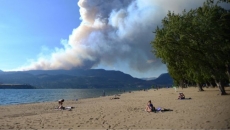The latest housing assessment figures in British Columbia show residential property markets softening across the province, but analysts say it may not bode well for affordability in the coming year.
The concerns stem largely from the potential drop in interest rates later this year, which may spur homebuying activity while housing supply remains limited, driving up prices.
"There are a lot of buyers on the sideline right now," said Central 1 Credit Union chief economist Bryan Yu.
"Once that certainty arises that rates are stabilized or are falling, we do expect to see that more buyers are going to come back and look into purchasing."
BC Assessment said Tuesday that the vast majority of markets in Metro Vancouver, the Lower Mainland, Sunshine Coast, Greater Victoria and the Okanagan saw the typical 2024 valuation of a single-family home stay within a five-per-cent increase or decrease in price.
It is "notably" less volatile than what the Vancouver area has seen in recent years, the Crown corporation said.
The assessed value of a single-family home in Vancouver which reflected the market on July 1, 2023, rose four per cent to just above $2.2 million, while strata properties remained nearly unchanged at $807,000.
"Across the Lower Mainland and throughout B.C., the overall housing market has generally stabilized in value," said Bryan Murao with BC Assessment in a statement, although he added commercial and industrial properties are seeing a higher rate of value increase due to the lack of land for such uses.
In Metro Vancouver, the only community with a shift beyond the five-per-cent range was the Village of Belcarra, which saw its typical single-family home value rise nine per cent to just over $2 million.
Assessments in Sechelt and Harrison Hot Springs were down by six per cent, while Hope dropped by 13 per cent.
No communities in the Okanagan or Greater Victoria surpassed five per cent in growth.
"For 2024, most homeowners can expect generally flat values including a mix of small decreases or only modest increases, reflecting the softening real estate market," said Vancouver Island deputy assessor Matthew Butterfield in a written statement.
Thomas Davidoff, an associate professor at the University of British Columbia Sauder school of business, said the appearance of a less volatile housing market may be deceptive.
"A five-per-cent change a year is actually a lot," Davidoff said. "If every year prices went up or down five per cent, within 15 years prices would have fallen in half or doubled. So, it's not a tiny effect, but smaller than we've seen recently."
He said that given the challenges with inflation and rising cost of living since 2022, the fact that property values are holding or even increasing slightly is evidence that B.C. homeowners are holding on to their homes and making adjustments elsewhere to make ends meet.
It may also mean that, when situations become more favourable, prices will resume an upward trend.
"Given the general increasing population in Canada and the ongoing challenge in adding housing supply, I think it is very likely that when rates come down we'll see an increase in prices," Davidoff said.
Overall, in the Lower Mainland and the Sunshine Coast, BC Assessment said total assessments have risen to nearly $2 trillion this year from about $1.94 trillion last year.
Increases were also observed from last year on Vancouver Island from $385 billion to over $386 billion, in the southern Interior from $303 billion to almost $315 billion, and in the north-central region from about $90 billion to more than $95 billion.
The assessments are used by government to provide homeowner grants, giving some relief on property tax bills ranging from $570 to $1,045 on homes that are valued at under $2.15 million.
Yu said the lack of new housing starts could also contribute to less affordability in B.C.
He said there were a large number of housing starts last year, driven by multi-family projects such as condos that had been planned years before the current economic challenges.
Yu said a slower housing market may be less enticing for new construction of homes, adding to the supply-side squeeze while higher levels of immigration feed stronger demand.
"My concern is that as you move forward, despite the fact that governments are pushing to drive new home supply higher, we're actually going to see a significant decline in housing starts over the next year to two years," he said.
"That's going to set the stage for another leg up in home price — and, again, a further deterioration of affordability."
BC Assessment said a lack of housing supply is playing a role in the Village of Port Alice on northern Vancouver Island, where single-family home values increased by 34 per cent to $349,000.
Other north and central B.C. communities also saw higher rates of fluctuation, with Haida Gwaii reporting a 22-per-cent spike to $283,000, while Prince Rupert dropped by eight per cent to $409,000.






